Onibaba Blu-ray Movie
HomeOnibaba Blu-ray Movie 
鬼婆 / The Demoness / Masters of CinemaEureka Entertainment | 1964 | 103 min | Rated BBFC: 15 | Feb 25, 2013
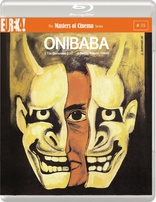
Price
Movie rating
7.8 | / 10 |
Blu-ray rating
| Users | 0.0 | |
| Reviewer | 4.0 | |
| Overall | 4.0 |
Overview
Onibaba (1964)
Deep in the windswept marshes of war-torn medieval Japan, an impoverished older woman and her daughter-in-law murder lost samurai and sell their belongings for the most meager of sustenance. When a bedraggled neighbor returns from battle, lust, jealousy, and rage threaten to destroy the trio’s tenuous existence, before an ominous, ill-gotten demon mask seals their horrifying fate.
Starring: Nobuko Otowa, Jitsuko Yoshimura, Kei Satô, Jűkichi Uno, Taiji TonoyamaDirector: Kaneto Shindô
| Foreign | Uncertain |
| Drama | Uncertain |
| Horror | Uncertain |
| Supernatural | Uncertain |
Specifications
Video
Video codec: MPEG-4 AVC
Video resolution: 1080p
Aspect ratio: 2.39:1
Original aspect ratio: 2.35:1
Audio
Japanese: LPCM 2.0 Mono (48kHz, 16-bit)
Subtitles
English
Discs
50GB Blu-ray Disc
Single disc (1 BD)
Playback
Region B (locked)
Review
Rating summary
| Movie | 4.5 | |
| Video | 4.5 | |
| Audio | 4.0 | |
| Extras | 3.5 | |
| Overall | 4.0 |
Onibaba Blu-ray Movie Review
Reviewed by Dr. Svet Atanasov March 12, 2013Kaneto Shindo's "Onibaba" a.k.a. "The Demoness" (1964) arrives on Blu-ray courtesy of British distributors Eureka Entertainment. The supplemental features on the disc include the film's original Japanese theatrical trailer; introduction by filmmaker Alex Cox; on-set footage shot by actor Kei Sato; and an audio commentary by director Kaneto Shindo and actors Kei Sato and Jitsuko Yoshimura. Also included with the release is a 36-page illustrated booklet. In Japanese, with optional English subtitles for the main feature. Region-B "locked".
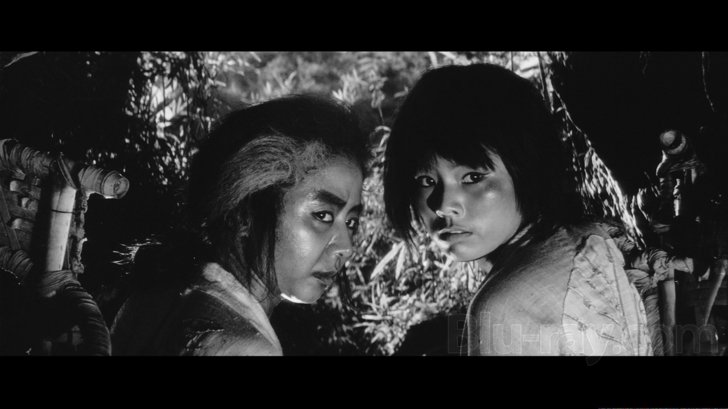
Don't tempt us
Feudal Japan, the 1400s. A bloody civil war has been underway for years. No one remembers how it started and no one knows when it will end. At one point in the film it is said that the casualties are so great that a black sun has risen in Kyoto.
Deep into the countryside, a samurai’s mother (Nobuko Otowa, Lost Sex, The Strangling) and wife (Jitsuko Yoshimura, Pigs & Battleships, Manji) have built a small house in the middle of a giant susuki grass field. They feel safe there because no one can see them from afar.
Occasionally, exhausted samurai retreat in the area to rest. The mother and her daughter-in-law kill them and throw their bodies in a large pit. Then they exchange their armor and weapons for food and saki. The two women have become so good in the art of killing that no one that enters the grass field leaves it alive.
During a hot summer day, Hachi (Kei Sato, Bullet Wound, Harakiri), a neighbor who long time ago also went to war, returns home with bad news – the samurai was killed in a bloody battle. At first the two women refuse to believe Hachi, but the more time he spends with them, the more convinced they become that he really witnessed the death of the man they have been waiting to come home.
Soon after, Hachi seduces the younger woman. Fearing that he would convince her to become his wife, the older woman warns her that all sinners eventually end up in purgatory. When she ignores the warning, the older woman decides to teach her an important lesson.
This legendary Japanese film directed by Kaneto Shindo (The Naked Island) was inspired by a Buddhist tale, but religion does not have a commanding presence in it. The film is concerned primarily with ethical, moral, and socio-political issues.
A self-described socialist, Shindo viewed capitalism as a closed system which, among other things, promoted self-destruction. Unsurprisingly, in Onibaba, an allegorical exploration of capitalism, the main protagonists are part of an inhumane supply-and-demand system which has determined how they live their lives. Killing and trading, in particular, are viewed by the main protagonists as essential for their survival activities.
As the film progresses, right and wrong are completely redefined. At some point all three protagonists are faced with a difficult dilemma, which they solve, but only after they seriously compromise themselves. With their human masks off, they become wild animals left with no other option but to self-destruct. Having made his point, Shindo turns the camera away from them and the film simply stops.
Cinematographer Kiyomi Kuroda’s (Shindo’s The Naked Island, Kuroneko) lensing is simple but elegant. The wider panoramic shots showing the susuki grass bending in the wind are especially beautiful. Shadow and light are also effectively used during the nighttime sequences where the demon appears.
The film’s atmospheric soundtrack was composed by long-time Shindo collaborator Hikaru Hayashi (The Life of Chikuzan, Postcard).
*In 1965, Onibaba won Blue Ribbon Awards for Best Supporting Actress (Jitsuko Yoshimura) and Best Cinematography (Kiyomi Kuroda).
Onibaba Blu-ray Movie, Video Quality 
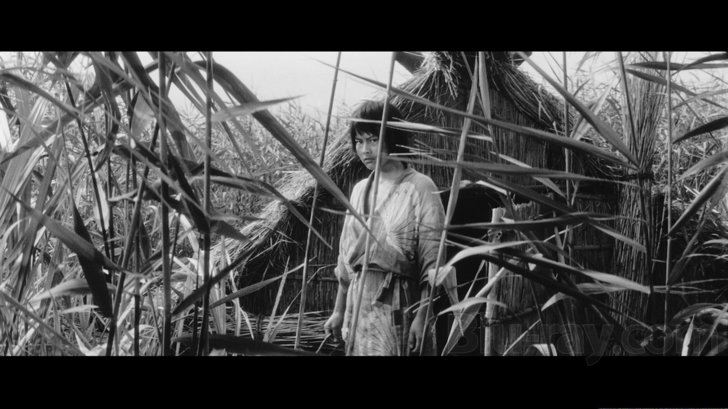
Presented in an aspect ratio of 2.39:1, encoded with MPEG-4 AVC and granted a 1080p transfer, Kaneto Shindo's Onibaba arrives on Blu-ray courtesy of British distributors Eureka Entertainment.
I like the high-definition transfer a lot. In fact, I would argue that it is one of the very best used by Eureka Entertainment for an Asian film from their catalog. Something else worth mentioning is that its basic characteristics seem very similar to those of the high-definition transfer Criterion used for their Blu-ray release of Shindo's Kuroneko.
Detail and depth are often outstanding, especially during many of the daylight close-ups (see screencapture #17). Clarity is also very good, even where light is restricted. Contrast is stable. Despite the fact that there are a few scenes where the blacks become a bit too strong (see screencapture #14), there is good overall balance balance between the blacks, grays and whites. There are no traces of excessive degraning corrections. Problematic sharpening corrections have not been applied either. Excluding a few shaky frame transition, there are no serious stability issues. Lastly, there are a few specks popping up early into the film, but there are no large cuts, debris, or damage marks. To sum it all up, this is a very solid organic presentation of Onibaba that is guaranteed to please its fans. (Note: This is a Region-B "locked" Blu-ray disc. Therefore, you must have a native Region-B or Region-Free PS3 or SA in order to access its content).
Onibaba Blu-ray Movie, Audio Quality 
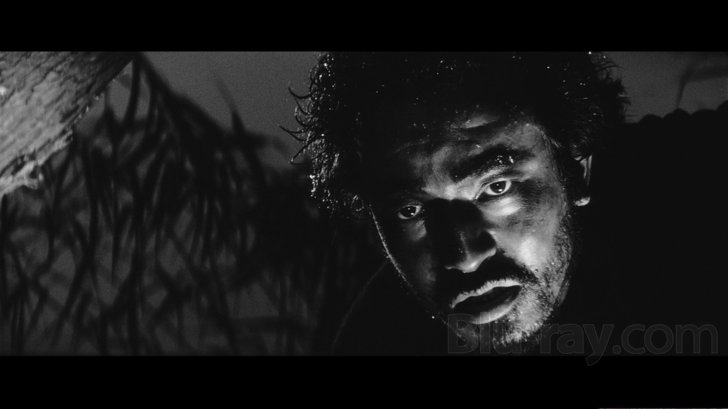
There is only one standard audio track on this Blu-ray disc: Japanese LPCM 2.0. For the record, Eureka Entertainment have provided optional English subtitles for the main feature. When turned on, they appear inside the image frame.
Excluding some very light background hiss that occasionally makes its presence felt, depth and fluidity are excellent. Hikaru Hayashi's atmospheric score also benefits from the lossless treatment, though one should not expect a wide range of nuanced dynamics. The sound is simply fuller, better rounded, and with stable high-frequencies. The dialog is clear and easy to follow. The English translation is excellent.
Onibaba Blu-ray Movie, Special Features and Extras 
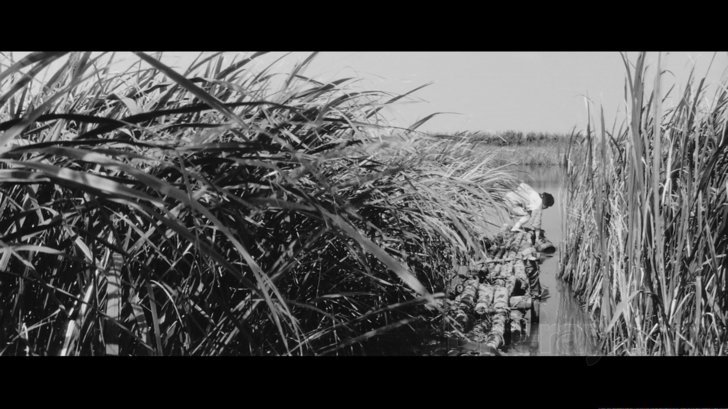
- Trailer - original Japanese trailer for Onibaba. In Japanese, with optional English subtitles. (3 min, 1080p).
- Introduction - filmmaker Alex Cox (Repo Man) introduces Onibaba. In English, not subtitled. (7 min, 1080p).
- On-Set Footage - presented here is super-8mm black & white footage shot by actor Kei Sato (Hachi) during the filming of Onibaba in the summer of 1964. Without sound. (38 min, 1080p).
- Commentary - this audio commentary, which was recorded in 2001, features director Kaneto Shindo and actors Kei Sato and Jitsuko Yoshimura. The commentary initially appeared on Eureka Entertainment's DVD release of Onibaba. In Japanese, with optional English subtitles.
- Booklet - a 36-page illustrated booklet featuring Doug Cummings' essay "Shindo's Onibaba"; "Waving Susuki Fields", a statement from writer/director Kaneto Shindo; "A Mask With Flesh Scared A Wife", the original short Buddhist story that inspired Onibaba; and technical credits.
Onibaba Blu-ray Movie, Overall Score and Recommendation 

Kaneto Shindo's Onibaba, an allegorical exploration of capitalism, should have a reserved spot in every serious collection. The film has transitioned to Blu-ray in an impressive fashion, and I think that a lot of people would be surprised to discover how good it looks and sounds forty nine years after its premiere. Let's hope that a North American release isn't too far behind, and that eventually we will also have the opportunity to revisit the Japanese director's equally fascinating The Naked Island after a similar treatment. HIGHLY RECOMMENDED.
Similar titles
Similar titles you might also like

Kuroneko
藪の中の黒猫 / Yabu no naka no kuroneko / Masters of Cinema
1968

Kwaidan
怪談 / Kaidan / Masters of Cinema
1965

The Ballad of Narayama
楢山節考 / Narayama bushikô / Masters of Cinema
1983

Beanpole
Дылда / Dylda
2019

Jeune & Jolie
Young & Beautiful
2013

Harakiri
切腹 / Seppuku / Masters of Cinema
1962

Beyond the Hills
După dealuri
2012

Mademoiselle
1966

Possession 4K
Limited Edition
1981

The Rocket
2013

Dark Water
仄暗い水の底から / Honogurai mizu no soko kara
2002

Throne of Blood 4K
蜘蛛巣城 / Kumonosu-jô
1957

The Life of Oharu
西鶴一代女 / Saikaku ichidai onna
1952

Through a Glass Darkly
Sĺsom i en spegel
1961

The Silence
Tystnaden
1963

Sansho the Bailiff
山椒大夫 / Sanshô dayű
1954

Ordet
1955

Viy
Вий / Spirit of Evil | Masters of Cinema
1967

The Painted Bird
Nabarvené ptáce / Montage Pictures
2019

Monos
2019
